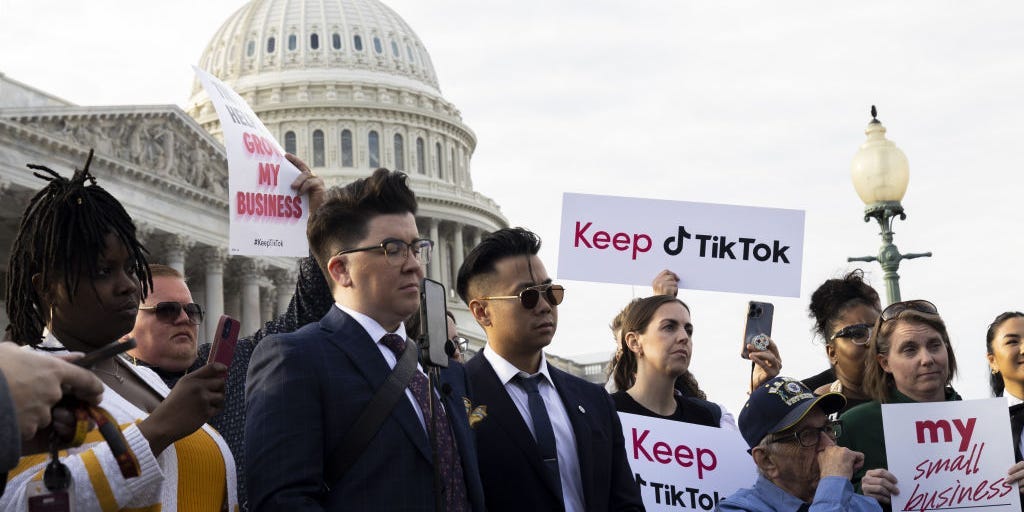- TikTok users are rallying against a US bill threatening to outlaw the app.
- The proposed bill would force ByteDance to sell TikTok or face a nationwide ban.
- Critics argue the bill displays double standards and threatens freedom of expression.
Thanks for signing up!
Access your favorite topics in a personalized feed while you’re on the go.
download the app

TikTokers have enthusiastically answered the app’s call to bombard members of Congress with calls and messages in an effort to prevent the platform from being banned in the US.
It comes after a bill was passed that ruled Chinese-owned ByteDance would either have to sell the company or it would be banned nationwide.
The bill, sponsored by Republican Rep. Mike Gallagher of Wisconsin and Democratic Rep. Raja Krishnamoorthi of Illinois, is a recycled version of the one the Trump administration previously advocated for that was repeatedly delayed and eventually dropped.
It was unanimously approved by the Energy and Commerce Committee on Thursday with a vote of 50 to 0. The US House of Representatives is due to vote on the bill next week.
A TikTok spokesperson told Business Insider the legislation has a “predetermined outcome,” which is a total ban of TikTok in the US.
“The government is attempting to strip 170 million Americans of their Constitutional right to free expression,” they said. “This will damage millions of businesses, deny artists an audience, and destroy the livelihoods of countless creators across the country.”
Why do lawmakers want it banned?
Lawmakers have long been critical of TikTok, which is used by more than 170 million Americans.
Those who want it banned argue that the app, being owned by a Chinese company, may be forced into giving over user data to the Chinese government, which it may use to increase the country’s influence.
In a statement announcing the bill, lawmakers said: “Applications like TikTok that are controlled by foreign adversaries pose an unacceptable risk to US national security.”
Another concern is the spread of misinformation, and that TikTok could be suppressing or amplifying certain topics due to governmental pressure.
TikTok has repeatedly denied these allegations and made attempts to distance itself from ByteDance. But the worries persist, as do attempts to crack down.
The state of Montana, for instance, banned TikTok entirely in 2023. An increasing number of states have also made the decision to ban TikTok on government-issued devices.
Despite concerns, some creators think the move is “the theft of TikTok” and all about money, while others think the US government’s goal is to gain more control.
New York Congressman Jamaal Bowman has also chimed in with his support, becoming a TikTok champion by promising to vote against the bill, and calling a potential ban “crazy.”
TikTok’s response was to present users with a pop-up when they opened the app, urging them to “stop a TikTok shutdown.”
“Let Congress know what TikTok means to you and tell them to vote NO,” it said.
The message then prompted users to input their ZIP code, to be supplied with the contact details of their Congress representatives.
So they got calling.
The response has been huge
Ben Stanley, of the account @cinematicscribbles, filmed himself ringing the office of Mary Miller, the representative of Illinois’s 15th congressional district.
He left a message with her office saying he requested she vote “no” to the bill because it would “take away my right to express freely in spaces not controlled by the government.”
“If she votes yes, she will become complicit in the suppression of free speech of 170 million Americans, and single-handedly destroy five million small businesses,” he said.
He said his own business would “shrivel and die” should TikTok be banned, which would have “detrimental effects” on his health and family because it was his main source of income.
Content creator Shira, who makes videos on TikTok and YouTube under the name @shirashiraonthewall, also filmed her phone call with her representative in Austin, whom she left anonymous.
On the call, Shira urged the congressman to reconsider the bill because “a lot of us do make a living off of it.”
He promised to “pass the message along.” Still, he reiterated other arguments that have been made in favor of the ban, such as that TikTok sells user data to China, and that the country has the ability to hack government phones through the app.
Shira responded on the call, saying other large tech companies, including Meta, X, and Amazon have all been accused of allowing China access to personal data as well.
This is a common argument from TikTokers who have shared their own analyses of the bill and what it means.
Many are skeptical, accusing Congress of double standards over other social media companies that sell data.
“They don’t want you uniting together so that you can start coming after them,” said one TikToker known as shipwreck_show.
A double standard?
Carolina Are, a platform governance researcher at the Centre for Digital Citizens at Northumbria University, told BI that people are angry over the proposed ban because there are freedom of expression and First Amendment issues at play.
She said how governments interfere or decide not to interfere with how platforms are governed is also concerning. Congress isn’t asking Meta to separate from Instagram, or Alphabet to separate from YouTube, for example.
“It really does show that there is a double standard there in the way the US government treats businesses from in and outside the US and in and outside the Western world,” she said.
Having US citizen’s data shared with the Chinese government is a national security issue that makes this situation unique, she added, but social media companies have a history of threatening international security in other ways.
The Cambridge Analytica scandal of 2018, for instance, saw third parties having access to voter behavior and user data from Facebook that had wide-reaching global implications from the 2016 US election to Brexit.
“It’s quite striking that TikTok is the hill they are willing to die on,” Are said. “And it shows that it has political motivations.”
Are said she has seen plenty of criticism of TikTok, with Universal Music Group pulling its songs from the platform, and inconsistent policies when it comes to shadowbanning certain groups, such as sex workers. This has led to some creators becoming disillusioned, she said.
“I feel this could be another hit against them in a time where they are under much-needed scrutiny,” she said.
“I do welcome more scrutiny into TikTok, but the US government as per usual, is doing it wrong.”
BI has contacted Congress and ByteDance for comment.


